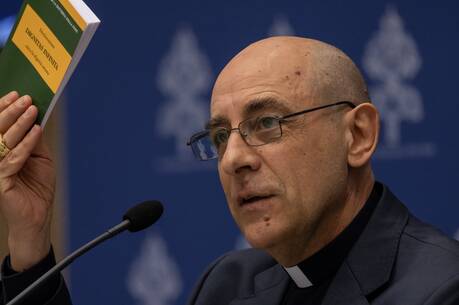Before he recites the parable in 18, 1-8, Luke indicates to the reader its central teaching: to pray always (continually, not continuously) and not to grow tired or discouraged (or lose heart). Then the parable shows that even the most hard-hearted will eventually yield to a request for justice. The implied question is, “What will a most loving person do when given a request for justice?” This ‘loving person’ is God and He receives such requests from his Chosen Ones. It is that relationship which decides the answer to the question; how could God not respond, and respond quickly, to His Chosen Ones’ requests for justice? Such is the love of God for His Chosen (or Baptized) Ones that He, the Just One, will be the contradiction of the unjust judge, and will not delay in delivering justice to His Beloved.
Given the indisputable love of God for His Chosen People, the logic of the parable’s teaching is rock-solid. God will not delay answering one’s requests for justice.
But then questions arise. For instance, must we always think of requests as requests for justice? And is this justice the final justice at the end of the world, at the final judgment, or is it the justice which is desired each day of the Christian life? One possible way of answering these questions is to note that the verses immediately preceding the parable are comments on the question, “When will the kingdom come?” And though Jesus’ immediate answer is that the kingdom is among (or within) you, his subsequent comments look to the final coming of the Son of Man (or the Day of the Son of Man). Thus, the prayers which one ‘should never stop praying’ and never grow tired of praying’ is, equivalently, “Thy kingdom come”.
But whether one thinks this parable is talking only about indefatigable prayer that the kingdom come, or is talking about many other kinds of prayers of petition, one still grapples with the all-too-often experience that God is not in a hurry to answer prayers of his faithful, that He is delaying.
But Luke’s interpretation of the parable already foresees or presumes this tense experience. That is why he asks for untiring prayer; he knows prayers are not always quickly answered, whether it be a prayer for personal good now, or prayer for the final coming when justice will finally prevail. Luke does not need to hear our complaints about divine delay. Indeed, the prayer of Jesus is Gethsemane, surely a prayer for justice from Beloved to Love, was a prayer unheard (or apparently so): ‘Let this cup pass’ never happened, even though Jesus wanted it so.
Luke remembers this parable some 50 years after the time in which the parable was first given. For Luke, though the parable seems to teach something idealistic and not practical, he nonetheless understands Jesus’ insistence (often appearing in other circumstances as well in the Gospel) that God so loves that He acts only lovingly – always.
In Chapter 11 (1-13), Luke offers other thoughts about the prayer of Christians: he offers a model prayer, then insists that God WILL hear prayer and finally teaches that one should ask, seek, knock, and not presume that prayer is unnecessary. Behind all Jesus’ thought is the complete trust in God’s love; it never fails, though we think it does. He died for that conviction.
In Luke 18, 1-18, there is the final concern or worry which nags at Jesus: but by the end of time will there still be faith alive? That is, will the Christian still be praying, and not tiring; will he still believe in God’s love for him? The story ends with a question – no doubt a question meant for the reader to answer.







